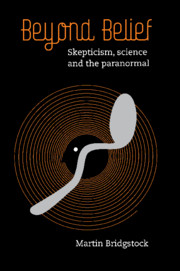Book contents
- Frontmatter
- Contents
- Preface
- Introduction: The paranormal and why it matters
- Chapter 1 The nature of science
- Chapter 2 The paranormal
- Chapter 3 Skepticism – from Socrates to Hume
- Chapter 4 Modern skepticism
- Chapter 5 Bringing skepticism down to earth
- Chapter 6 Skepticism, ethics and survival
- Chapter 7 Skepticism beyond the paranormal
- Bibliography
- Index
Chapter 3 - Skepticism – from Socrates to Hume
Published online by Cambridge University Press: 05 April 2010
- Frontmatter
- Contents
- Preface
- Introduction: The paranormal and why it matters
- Chapter 1 The nature of science
- Chapter 2 The paranormal
- Chapter 3 Skepticism – from Socrates to Hume
- Chapter 4 Modern skepticism
- Chapter 5 Bringing skepticism down to earth
- Chapter 6 Skepticism, ethics and survival
- Chapter 7 Skepticism beyond the paranormal
- Bibliography
- Index
Summary
We will now look at the third term in the book's title: skepticism. As with science and the paranormal, we will begin with the intellectual aspects of skepticism. Then, just as we did with science and the paranormal, we will ask how skepticism is rooted in modern society. Because there is a long history involved, we will look at some important historical figures here, and move to the modern movement in Chapter four.
Some aspects of skepticism can be traced back to thinkers more than two thousand years ago. As we will see, some of these ancient skeptics had something in common with modern skepticism, but in general their aims were rather different. Still it is worthwhile to look at the approaches of the ancient philosophers. Their ideas helped form the modern movement, and their thoughts are often fresh, vital and relevant today.
This is not a complete history of skepticism, and it does not mention all of the people who called themselves skeptics. The aim is simply to highlight some of the most important thinkers and exactly what they contributed to modern skepticism. We will start with a simple question: exactly what do we mean?
WHAT EXACTLY IS SKEPTICISM?
If we look at almost any definition of skepticism (or scepticism) in a dictionary, we will find one recurring element: the idea of doubt. Skeptics, we are told, doubt the truth of propositions. They may also doubt religious belief.
- Type
- Chapter
- Information
- Beyond BeliefSkepticism, Science and the Paranormal, pp. 64 - 85Publisher: Cambridge University PressPrint publication year: 2009



